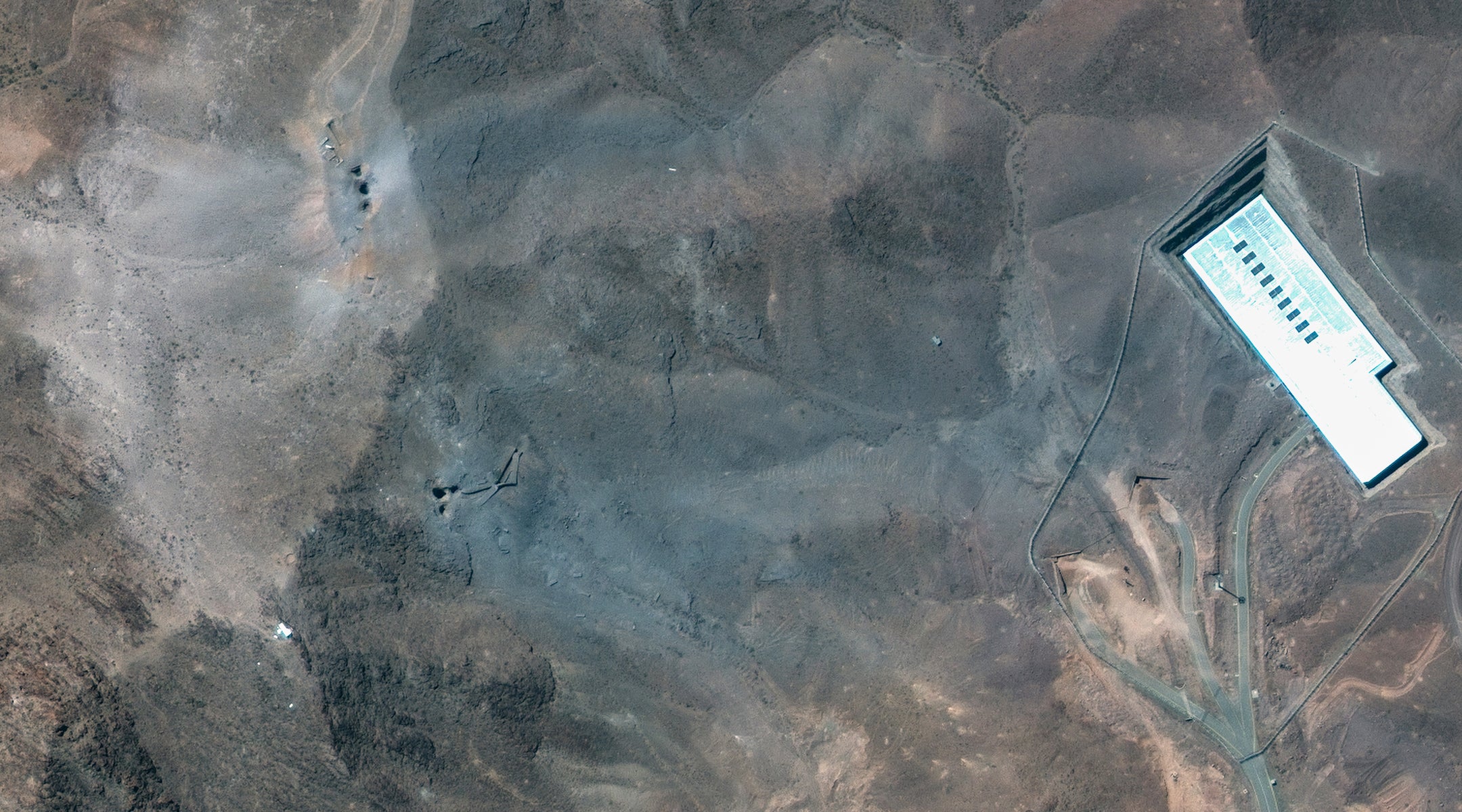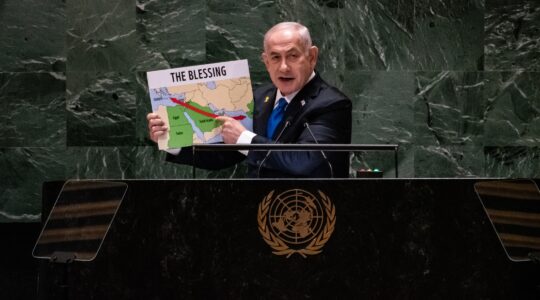As Iran and Israel enter a ceasefire following 12 days of heavy bombardment between the countries, the leaders of Israel and the United States are hailing the strikes on Iranian nuclear facilities as a victory.
But as the smoke clears, some experts are questioning the extent of the damage to Iran’s nuclear program.
An assessment by the Defense Intelligence Agency, first reported Tuesday by CNN, showed the Saturday night strikes by U.S. bombers on Iranian nuclear sites did not “obliterate” the country’s nuclear enrichment program, as President Donald Trump claimed, but instead set it back “a few months.”
“So the [DIA] assessment is that the U.S. set them back maybe a few months, tops,” one anonymous source briefed on the report told CNN. Another individual told CNN that Iran’s centrifuges, which are used in the enrichment process, are largely “intact.”
Trump and his allies pushed back hard against the assessment by the DIA, an intelligence agency within the U.S. Department of Defense, with Trump saying Wednesday that the report was inconclusive.
“The intelligence says, ‘We don’t know, it could have been very severe’ — that’s what the intelligence says,” Trump told reporters as he attended meetings at a NATO summit.
“The original word that I used — I guess it got us in trouble, because it’s a strong word — it was ‘obliteration.’ And you’ll see that — and it’s going to come out. Israel is doing a report on it, I understand. And I was told that they said it was total obliteration,” Trump said.
The conflict began on June 13 with Israel carrying out strikes on Iranian nuclear sites and targeting the country’s leading nuclear scientists. On Saturday, the United States entered the conflict, bombing three key nuclear sites in Iran — Fordow, Natanz and Esfahan.
In an address following the United State’s strikes, Trump stated that “Iran’s key nuclear enrichment facilities have been completely and totally obliterated,” and the two countries entered a ceasefire announced by Trump Monday evening.
Israeli Prime Minister Netanyahu also hailed the success of the military campaign, saying in a video address that U.S. forces had “destroyed” the underground Fordow enrichment site and that “we sent Iran’s nuclear program down the drain.”
On Wednesday, the White House published a statement attributed to the Israel Atomic Energy Commission the stated that Iran’s ability to develop a nuclear weapon had been pushed back “by many years.”
“The devastating U.S. strike on Fordow destroyed the site’s critical infrastructure and rendered the enrichment facility inoperable. We assess that the American strikes on Iran’s nuclear facilities, combined with Israeli strikes on other elements of Iran’s nuclear program, have set back Iran’s ability to develop nuclear weapons by many years,” read the statement. Netanyahu’s office released an identical statement one hour later.
In the wake of the United State’s strikes, Iran’s Atomic Energy Organization confirmed their validity, but said the strikes would not stop Iran from advancing its nuclear program.
White House press secretary Karoline Leavitt told CNN in a statement that the reported DIA assessment was “flat-out wrong,” adding that “everyone knows what happens when you drop 14 30,000 pound bombs perfectly on their targets: total obliteration.”
Defense Secretary Pete Hegseth also asserted the success of the attacks in a statement, telling CNN that the bombing campaign had “obliterated Iran’s ability to create nuclear weapons.”
One key question that has emerged following the conflict is the fate of Iran’s uranium stockpiles, a material that can be enriched to produce nuclear weapons.
A preliminary classified U.S. report reviewed by the New York Times suggested that much of Iran’s stockpile of enriched uranium was moved from the targeted locations before the strikes, and that little of the nuclear materials had been destroyed.
Growing evidence also suggested that Iran had removed 400 kilograms of uranium enriched to 60% purity from its nuclear sites, a figure just below the 90% purity needed to make a nuclear weapon.
The International Atomic Energy Agency (IAEA), the United Nation’s nuclear watchdog, has requested it return to Iran’s nuclear sites so it may account for their stockpiles.
“At this time, no one including the IAEA, is in a position to have fully assessed the underground damage at Fordow,” said IAEA Head Rafael Grossi in a statement.
But on Wednesday, Iran’s parliament approved a bill that suspended its cooperation with IAEA, stipulating that any full inspections by the watchdog would need approval by the Supreme National Security Council.
Vice President J.D. Vance said in an interview with Fox News host Bret Baier Monday that the location of Iran’s uranium “is not the question before us,” instead claiming that the question is: “Can Iran enrich the uranium to weapons-grade level, and can they convert that fuel into a nuclear weapon?”
Vance claimed that the answer was no, adding that the country’s nearly 900 pounds of uranium is “buried” following the United State’s strikes.
Secretary of State Marco Rubio said Sunday that he doubted Iran had been able to move the enriched uranium, telling CBS News’ “Face the Nation” that “we have to assume that there’s a lot of 60% enriched uranium buried deep under the ground there in Isfahan.”
On Sunday, Chairman of the Joint Chiefs of Staff Gen. Dan Caine told reporters that an assessment of the extent of the damage to Iran’s nuclear sites was “still pending,” adding that it would be “way too early for me to comment on what may or may not still be there.”
Jeffrey Lewis, a professor of nonproliferation at the Middlebury Institute of International Studies at Monterey, also cast doubt on the efficacy of the strikes, writing in a post on X that they may turn out to be “strategic failures.”
“Why am I so unimpressed by these strikes? Israel and the US have failed to target significant elements of Iran’s nuclear materials and production infrastructure. RISING LION and MIDNIGHT HAMMER are tactically brilliant, but may turn out to be strategic failures,” the post read, using the names Israel and the United States gave to their separate operations.
In an interview with The New Yorker, Nicole Grajewski, a fellow at the Carnegie Endowment for International Peace’s Nuclear Policy Program, said that the status of Iran’s nuclear program was “quite murky” in the wake of the attacks.
“We now know that Iran has moved or diverted some of its highly enriched uranium or perhaps some of its centrifuge components from the Fordow site that was bombed by America,” Grajewski said. “It is all quite murky, but the situation doesn’t look incredible at the moment.”
The Royal United Services Institute (RUSI), a defense and securities think tank in London, wrote in a statement that the “success of the operation is not immediately apparent.” RUSI analysts also speculated that the attacks on Iran may spur the regime to double down on its efforts to produce a nuclear weapon.
“The latest round of strikes and the fact that the US has – for the first time – carried out direct attacks on Iranian territory may very well result in a decision in Tehran that the only option they have for an effective nuclear deterrent is to produce a nuclear weapons capability,” RUSI’s analysts said.
The Council on Foreign Relations, an American think tank focused on U.S. foreign policy and international relations, said in an article published Monday that the “hunt for the four hundred kilograms of enriched uranium continues” following the attacks.
“U.S. and international officials said they were unsure what became of them, so the question remains whether the attack destroyed the Iranian nuclear program, or just forced it into smaller, more secretive pockets of Iran’s web of thirty-odd nuclear sites,” the article read.
U.S. Rep. Brad Sherman, a California Democrat who is Jewish, cast doubt on the “obliterated” claim, saying the strikes may have eliminated Iran’s abilities to enrich uranium “in the future,” but that it already had enough near-weapons grade uranium on hand. He urged the administration to re-enter negotiations with Tehran.
“Iran already has stockpiled enough near-weapons grade uranium for about 9 bombs,” Sherman, the senior member of the House Foreign Affairs Committee, said in a statement. “Only coercive diplomacy can eliminate that immediate threat.”
JTA has documented Jewish history in real-time for over a century. Keep our journalism strong by joining us in supporting independent, award-winning reporting.






